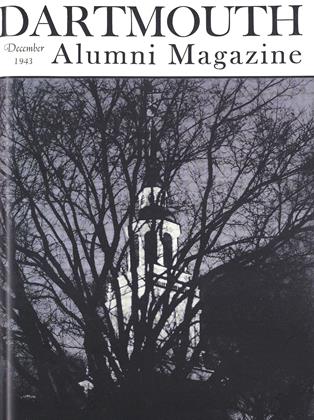I WANT TO WRITE FIRST of two books which, as far as I'm concerned, are worth four stars.
The first is Albert Jay Nock's Memoirs of a Superfluous Man (Harper & Brothers, 1943) which is altogether the most civilized book I have read in a long time. Nock is a classicist, a humanist, and legitimate member of what Mr. Hopkins once described as the "aristocracy of brains." To some Nock will appear as an irascible fellow with a bad digestion, but not to me. I regard him as a brother.
Hear what he says about reading: "I do not mean that the great majority are unable to read intelligently; I mean that they are unable to read at all—unable, that is, to carry away from a piece of printed matter anything like a correct idea of its content Reading implies a use of the reflective faculty developed much beyond the anthropoid stage, let alone possessing it at a stage of development which makes reading practicable." Henry , Adams would have understood this.
With charm and lucidity Nock writes about his boyhood, his education, his travel; on man, history, war, love, religion, and women.
It is a book to buy and reread, but I doubt if it sells.
The other is a book called The LittleLocksmith (Coward-McCann) by Katherine Butler Hathaway.
This is one of those very rare creations: a work of art.
It is the story of the spiritual life of one whom Henry Beston recently called "a real person." It is the triumphant story of a woman who would not accept defeat even though through a long childhood illness she never grew taller than a child of ten. She was an unconquerable spirit and her story is a magnificent one.
Katherine Butler (b. 1890) grew up in Salem, Massachusetts, and died there a year ago this Christmas. She spent much of her life in Castine, Maine, and later at Blue Hills not far away. She learned to write the hard way and as she was a poet her prose takes on a kind of beauty, a kind of sheen, granted to only a very few writers.
Her book will be on my shelf next to Barbellion, and not more than three tiers from Emily Dickinson and Emily Bronte.
Most amazing: it is the choice of the Book-of-the-Month Club.
Bucklin Moon's The Darker Brother (Doubleday) is a rather violent story, but one reeking with authenticity, of how it is, and what it means, to be a negro living in these United States in the decade of the thirties and the forties.
Captain Ralph Ingersoll has written a good war book in The Battle is the Payoff (Harcourt). This tells of an engagement in Tunisia and it is valuable not because it tells the story of a battle well but because the author is scrupulously honest about his reactions and observations as a civilian soldier.
Lippincott has published a little book of notes on two years escorting duty in a corvette called H. M. Corvette by Lt. Nicholas Monsarrat RNVR. Worth reading.
I find I have notes also on Out in theBoondocks in which twenty-one marines tell their stories of the Solomons; Cedric Belfrage's amusing notebook of an escapologist going around the world (in 1938) called Away From It All; W. C. White's Queens Die Proudly about the B-17's in the South Pacific and about which Lt. Gen. Brett wrote, "so far as memory serves, the incidents you described of the operations in Java and Australia are historically correct."
Jacob's Ladder by Frank Kingdon (Fischer, 1943) is a sincere and honestly moving story of an Englishman's conversion to Democracy and Americanism.
Dean E. Gordon Bill sends me some random notes:
"By all means read The Case for Mrs.Suratt by Helen Jones Campbell. It is a gripping and detailed account of this infamous trial. Incidentally, having just read Paris Underground, I was shocked to realize that prison conditions and governmental corruption in Washington in 1865 were just about as bad as conditions in Paris at the present time.
"If you happen to be a lover of Arthur Train's Mr. Tutt stories, you certainly will enjoy Yankee Lawyer: The Autobiography of Ephraim Tutt. Incidentally, this is a book which I should like all prospective lawyers to read.
"Please read Mary Laswell's Suds inYour Eye .... it is a grand book, and of more value to our morale than 99% of these war books. It is simply the story of three grand old biddies, two widows and a spinster, who were always kind-hearted, always full of prunes, and always enjoying several bottles of cold beer."
 View Full Issue
View Full Issue
More From This Issue
-
 Article
ArticleV-12 PHYSICAL TRAINING
December 1943 By C. E. W. -
 Article
ArticleA REPORT ON FINANCES
December 1943 -
 Class Notes
Class Notes1937
December 1943 By JOHN H. DEVLIN JR., FRANCIS T. FENN JR. -
 Article
ArticleEMPLOYMENT FOR ALUMNI
December 1943 By PROF. FRANCIS J. NEEF -
 Class Notes
Class Notes1933
December 1943 By GEORGE F. THERIAULT, LEE W. ECKELS -
 Article
ArticleSHATTUCK OBSERVATORY
December 1943 By L. B. RICHARDSON '00
HERBERT F. WEST '22
-
 Books
BooksWHEN WE SKI
April 1937 By Herbert F. West '22 -
 Books
BooksCRIMSON PHILIPPINE JUNGLE
January 1944 By Herbert F. West '22 -
 Article
ArticleHanover Browsing
October 1944 By HERBERT F. WEST '22 -
 Books
BooksMY QUEST FOR FREEDOM
June 1945 By Herbert F. West '22 -
 Article
ArticleHanover Browsing
November 1946 By HERBERT F. WEST '22 -
 Books
BooksWILD TRAIN: The Story of the Andrews Raiders
January 1957 By HERBERT F. WEST '22







